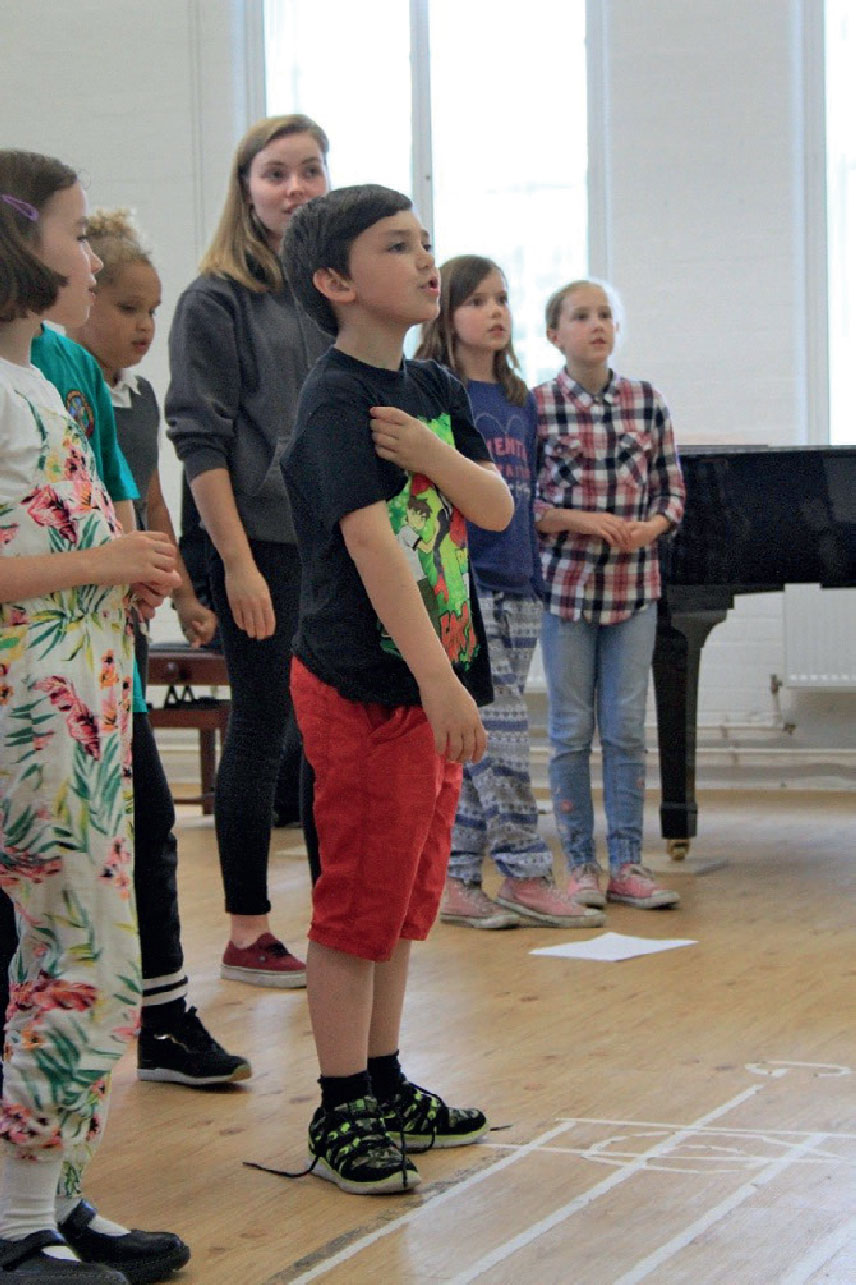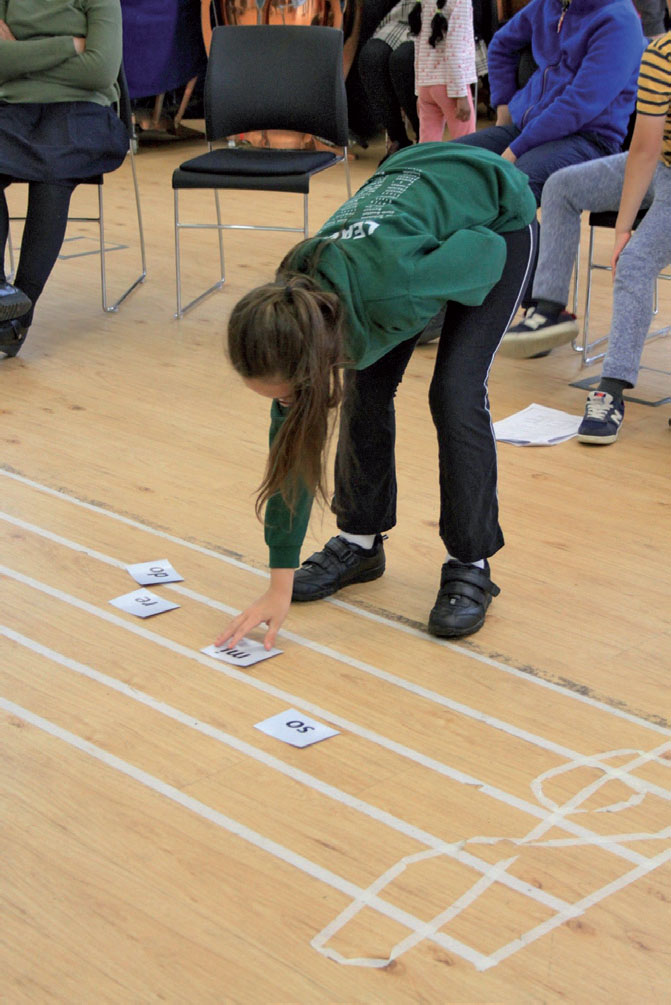
The music specialism on the BA in Primary Education (QTS) at the University of Reading is an undergraduate programme for students who want to train as music subject leaders in primary schools. This specialist primary music education course is one of the few in the country to offer study in music at university level alongside dedicated training in music teaching. Students develop their classroom musicianship and musical leadership through taught sessions in university and school-based projects. Practical, hands-on learning is very important on our programme. Our students apply what they learn in university to teaching in our partnership schools, learning by experience what works in real classrooms with real children.
Universal Voices is one of our community outreach projects. It is a free community children's choir for children aged 8 to 13 at the university's Institute of Education. I direct the choir with a volunteer team of students, offering an excellent choral education to any child in the local area. We teach solfa musicianship, vocal production, and choral performance. Rehearsals take place in our newly refurbished music building on the lovely London Road campus, and the choir have performed in concerts at the university and around Reading. Our music education students work as assistant conductors, project manage the choir and teach musicianship to the children
I founded Universal Voices in March 2017 so that music education students at the university could learn to run a children's choir by actually running a children's choir. Our students learned conducting and vocal leadership as part of their programme, and I felt that students also needed a guided placement with a children's choir on campus so that they could apply these skills with children learning to sing in real time. It is useful for trainee music teachers to experience working through a rehearsal schedule to a successful performance and learn how to support children with different learning needs to achieve the highest possible standard of choral performance. The practical, hands-on experience of managing the logistics of rehearsals and performances, leading warm-ups and vocal training, teaching musicianship classes and helping prepare the children for concert performance has been invaluable for our student volunteers. Most importantly, they learn how much fun it is to run a choir, and what joy it is to sing with children. I have seen students develop in confidence and fluency during their time with Universal Voices and am really delighted to see that the graduating class of 2018 have already started replicating this work in the schools where they now work as newly qualified primary teachers.
Musicianship training is central to everything we do in music education at Reading. We teach musicianship skills to all our undergraduates and postgraduates. I feel very strongly that it is essential for teachers to develop their own musicianship in order to be able to model and lead creative music-making in the classroom. Music teachers should be confident and fluent in their own musicianship and use these skills in their teaching every day to give pupils a rich musical experience. It is not enough for me that children just participate in choral singing, fun though that is. I feel that they should also be trained in the musicianship skills of accurate intonation for tuneful singing, aural memory, two-part hearing, demonstrating aural acuity through movement work and body percussion, as well as reading pitch and rhythm notation and choral scores so that they become increasingly more knowledgeable about what they are doing. I want our music education students to know how to do this. Team teaching with the student volunteers enables me to show them the long-term benefits of building a music curriculum on musicianship training, and the importance of developing their own classroom musicianship skills to lead this work.
Giving 20 minutes a week to musicianship in each 75-minute rehearsal has proved very effective. We use the excellent Go for Bronze scheme published by the National Youth Choir of Scotland (NYCoS), which uses solfa pedagogy to teach musicianship skills through games and activities that lead to more formal learning of notation reading and associated music theory. The children develop their aural acuity, musical knowledge and sight-reading skills from the very beginning, which they can apply directly to the choral music they are singing. This year, the choir is divided into four musicianship groups – Pitch Monkeys, Accelerando, Tuning Forks and Double Sharps, each taught by a student teaching team. The Pitch Monkeys and Accelerando groups are children who joined since September 2018 and are working towards taking their Bronze Level 1 certificates by the end of this year. Accelerando is the fast-track group of older beginners, and those who have some prior music training as instrumentalists. The Tuning Forks (Years 3, 4 and 5) and Double Sharps (Years 6, 7 and 8) took their Bronze Level 1 certificates in June 2018, and are working towards Level 2. We have regular review meetings as a staff team to appraise how the groups are progressing. Students benefit enormously from team teaching, sharing and developing their skills together, and take the lead on planning and delivering these sessions.

Children from Universal Voices sing with music education students
Universal Voices is funded through our University's Campaign and Supporter Engagement Office which has enabled us to make the choir free and accessible to all children. There is a high proportion of children from low-income families in our target postcodes of RG1 and RG2. A free choir centrally located within easy walking distance is a useful resource for these families. We have also been able to invest in resources and equipment, and support further music education outreach activities. We present an annual Partnership Festival, where children from our partnership primary schools join us for a festival of choral singing in the Reading University Great Hall. Music education students take on a number of management and leadership roles in organising this concert each year, including arranging the music, assisting in the CPD training for schools, leading rehearsals in schools, and managing the concert logistics on performance day. We performed Britten's Noye's Fludde in March 2018, with students playing in the orchestra and taking the solo parts of Noye, Mrs Noye, and their families. The children took the roles of animals and Noye's children. In March 2019, we presented Animal Crackers, which showcased classroom instrumental performance projects that Reading students led in partnership schools throughout the spring term. Our student conductors directed the singing and it was wonderful to see them in action.

Musicianship training in Universal Voices – working with the floor stave
So, what's next for Universal Voices? As our numbers rise, we are developing a vocal coaching programme to support and challenge both older and younger children in the choir. To promote this way of working, we are running musicianship training courses to introduce teachers to teaching with tonic solfa in choir and classroom. You can find out more about this training at reading.ac.uk/music. Every year, we welcome new students to study music education at the Institute of Education and inspire more trainee teachers to lead singing in their schools.








